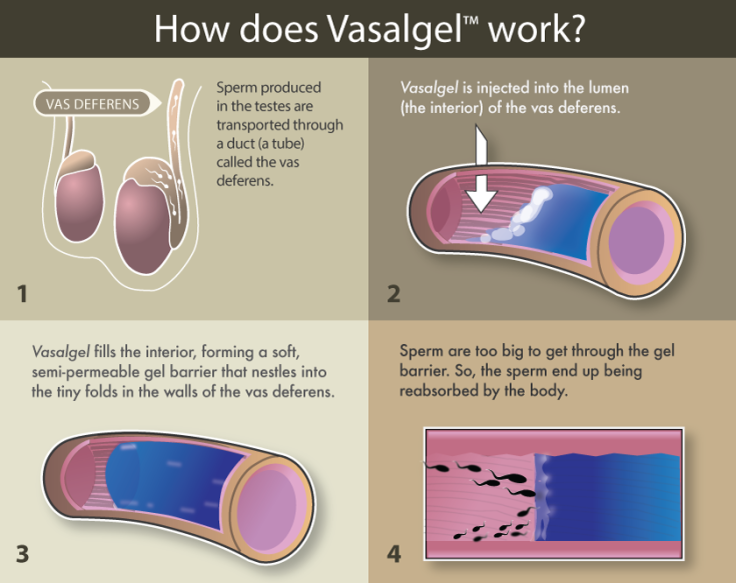Male Birth Control Pills? Contraceptive Gel Injection Might Be Effective After Successful Trials, Research Shows

Researchers from the Parsemus Foundation said that a new male contraceptive gel injection to completely prevent pregnancy has been found to work reliably in a trial performed on rabbits and monkeys, thus increasing the possibility of male birth control in humans.
In a report, published Monday in the journal, Basic and Clinical Andrology, researchers said they had tested a new contraceptive gel called Vasalgel in male monkeys, and found that it was effective at preventing pregnancy during the monkeys' mating seasons. Vasalgel consists of a polymer gel injected into the vas deferens, which is the tube through which the sperm flows. The gel blocks the passage of sperm from the testicles into the penis thus barring them from escaping. It's effects have been long lasting and reversible.

The Parsemus Foundation confirmed the results in a statement based on their tests done on rabbits earlier.
The Parsemus Foundation that created the gel said this had been a two-year trial, after which they published the results in Basic and Clinical Andrology and that the gel works well and is safe at least in primates. The researchers said they want to gather more evidence in the upcoming days so that they can test the gel on humans as soon as possible. If the trials go well and they get enough funding then it will seek regulatory approval to make the gel more widely available to men. If this works out then Vasalgel would be the first new form of male contraceptive to hit the market in numerous decades.
Catherine VandeVoort, of the California National Primate Research Centre and the study’s lead author, reportedly said: "Men's options for contraception have not changed much in decades. There's vasectomy, which is poorly reversible, and condoms. If they knew they could get a reliable contraceptive that could also be reversed I think it would be appealing to them."
Allan Pacey, professor of andrology at the University of Sheffield, said: "The study shows that, in adult male monkeys at least, the gel is an effective form of contraception. But in order for it to have a chance of replacing the traditional surgical method of vasectomy, the authors need to show that the procedure is reversible." He also specified that previously there had been very little commercial interest from pharmaceutical companies in this kind of a approach. The Parsemus Foundation, which is a non-profit company researching Vasalgel, has used several methods to raise funds and grants to get this far.
Prof Pacey added "The idea of a social venture company to develop the idea is intriguing. I would imagine there is a worldwide market for a new male contraceptive, but trials in humans and more long-term safety data are required before we will know if it is a success."
© Copyright IBTimes 2024. All rights reserved.






















